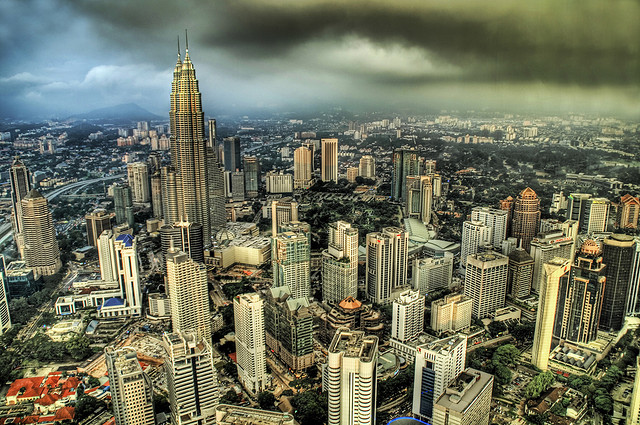“Malaysian ‘tsunami’ created electoral debacle”
March 28 As Malaysia readies for a general election, Bernard Lim, 19, of Singapore, looks at the political and economic events that led to a ‘tsunami’ of support for the opposition in the 2008 vote.
As Malaysia readies for a general election, Bernard Lim, 19, of Singapore, looks at the political and economic events that led to a ‘tsunami’ of support for the opposition in the 2008 vote.
In Malaysia’s 2008 General Elections, Barisan Nasional was thrashed by the main opposition coalition, Pakatan Rakyat (People’s Alliance).
It lost five state legislatures, 82 parliamentary seats and the two-thirds majority in parliament required to pass constitutional changes and maintain a political psychological threshold.
Many reasons were cited for the huge loss.
In Malaysia, annual inflation hit all-time highs in 2008. Food and beverages prices rose in April by 5.7 per cent. The price of electricity also rose in the week before the elections – 18 per cent increase for households and 26 per cent for commercial and industrial users. Inflation directly threatened the people’s livelihood as it lowered the purchasing power of the currency. It was so serious that it provoked several protests. On 5th June 2007, approximately 200 people demonstrated in Ipoh, Perak, and 50 people in the capital, Kuala Lumpur. Although the BN government tried to reduce the pressure through subsidies, it led Malaysians to believe that a BN win would further increase the inflationary pressure on them. This caused a swing to the opposition.
Prime Minister Abdullah Badawi promised to eradicate corruption and poverty after winning 91 per cent of parliamentary seats in 2004. However, almost none of his plans had been completed – a promised anti-corruption agency was never set up, corruption worsened, the widening poverty gap ignored and inflation wrecked havoc.
When Johor struggled with floods in 2006, the Prime Minister was in Perth to inaugurate his brother’s restaurant, making him look callous. The keris-wielding of Home Affairs Minister Hishamuddin Hussein caused protests by the country’s Chinese and Indian minorities, who perceived it as offensive. Scandals abounded, and some of the unsavory allegations involved senior leaders. This led the Malaysian people to believe that the BN government was unreliable, diminishing BN’s credibility.
Many Malaysian minorities voted for the opposition because the NEP (New Economic Policy) had disadvantaged them. It was implemented by governmental agencies in 1970 to boost the social status of Bumiputeras (‘sons of the soil’ – Malays and indigenous peoples). University quotas enable more Malays to enter universities, while preferential status for Malays to acquire jobs and government contracts had made Malaysian minorities second-class citizens.
Even though the NEP had been largely effective in helping Malays out of poverty, it led to cronyism. Many BN ministers ‘loaned’ their special privileges to businessmen for money. It has also aroused the ire of the minorities, who should deserve the opportunities afforded by the Bumiputras, since Article 8 of the Constitution states that all Malaysian citizens shall be equal under the law. Many minorities chose to register their anger in this election in large numbers.
A coalition was formed by the major opposition parties, Democratic Action Party (DAP), Islamic Party of Malaysia (PAS) and Parti Keadilan Rakyat (PKR), which bestowed a veneer of unity and prevented multi-party contests, ensuring many victories. In the past, multiple candidates had split the vote, allowing BN candidates to gain seats with a plurality. In comparison, BN was disunited in 2008. Many “parachute candidates” chosen to stand in their respective constituencies did not have the support of the local BN grassroots members. Consequently, many seats were lost.
Anwar Ibrahim of PKR, a former Deputy PM, had welded the opposition into a potent force. He was once a BN member! An earlier inhibition preventing Anwar Ibrahim from contesting was a boon, as he could electioneer across Malaysia. Regular criticisms of Anwar Ibrahim in pro-BN newspapers made voters view him as an underdog. His oratory swung the audience, telling what they wanted to hear. Many voted for him.
During the elections, BN revealed that indelible ink would not be used to prevent fraud. Malaysians suspected that the BN government planned to stuff the ballot boxes with false votes. Also, reports that nearly 9,000 people aged 100 years old and above voted led to suspicions that there could be vote fraud. This led many voters to vote for the opposition to repudiate the perceived vote fraud.
In the 2008 elections, it was a multi-racial political tsunami, one in which Malaysian citizens across the three main races voted for the opposition. Ordinary Malaysians have the chance yet again to decide their country’s future in 2013. Again, many issues remain unsolved. New scandals concerning the Port Klang Free Zone and National Feedlot Corporation may persuade more voters that a change of government is inevitable to uproot systemic corruption. The issue of religion may also swing votes – the use of the word “Allah” by non-Muslims has sparked off a national debate.
Elections will have to be called by April 2013. Will Pakatan Rakyat or Barisan Nasional triumph?
Photo credit: <a href=”http://www.flickr.com/photos/stuckincustoms/521001746/”>Stuck in Customs</a> via <a href=”http://photopin.com”>photopin</a> <a href=”http://creativecommons.org/licenses/by-nc-sa/2.0/”>cc</a>
Opinions expressed in this article are those of the author and do not necessarily represent the views of the Commonwealth Youth Programme. Articles are published in a spirit of dialogue, respect and understanding. If you disagree, why not submit a response?
To learn more about becoming a Commonwealth Correspondent please visit: http://www.yourcommonwealth.org/submit-articles/commonwealthcorrespondents/
…………………………………………………………………………………………………………………






